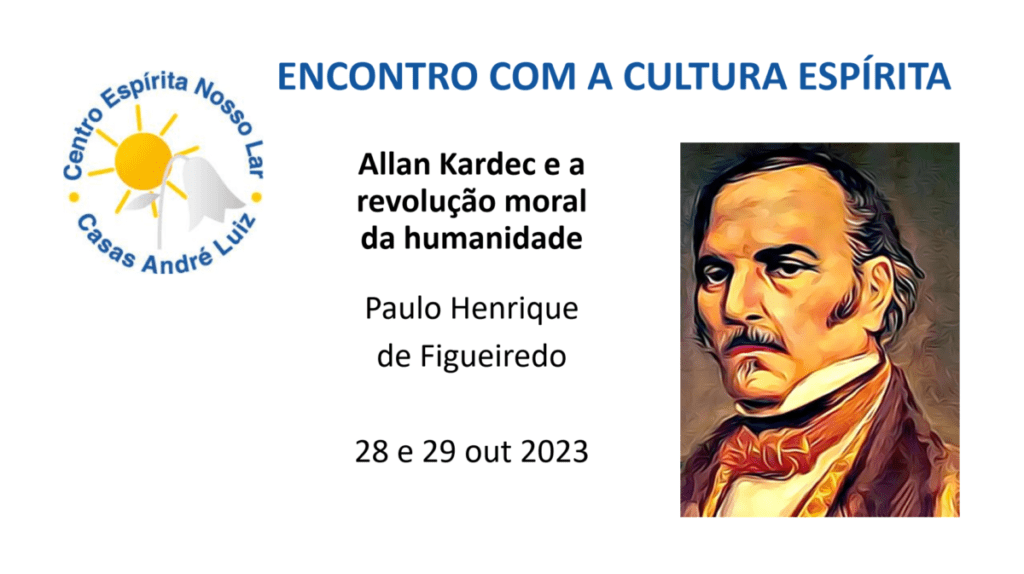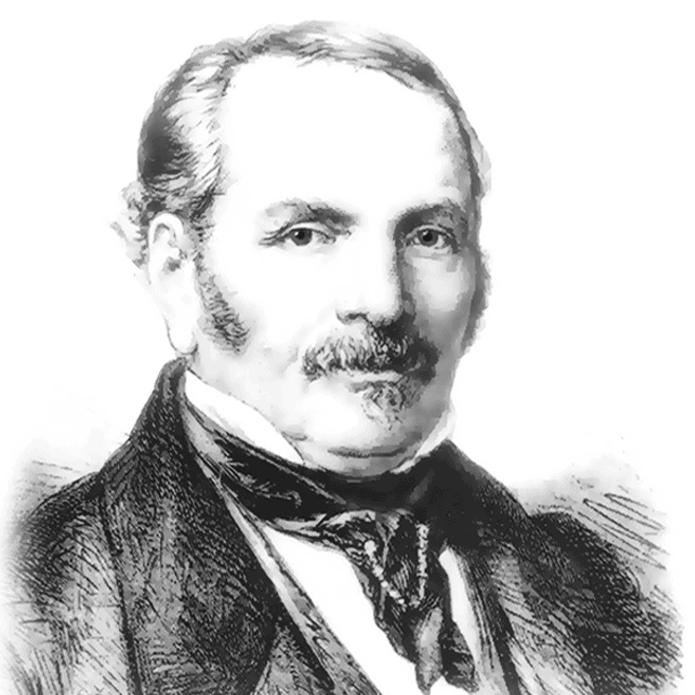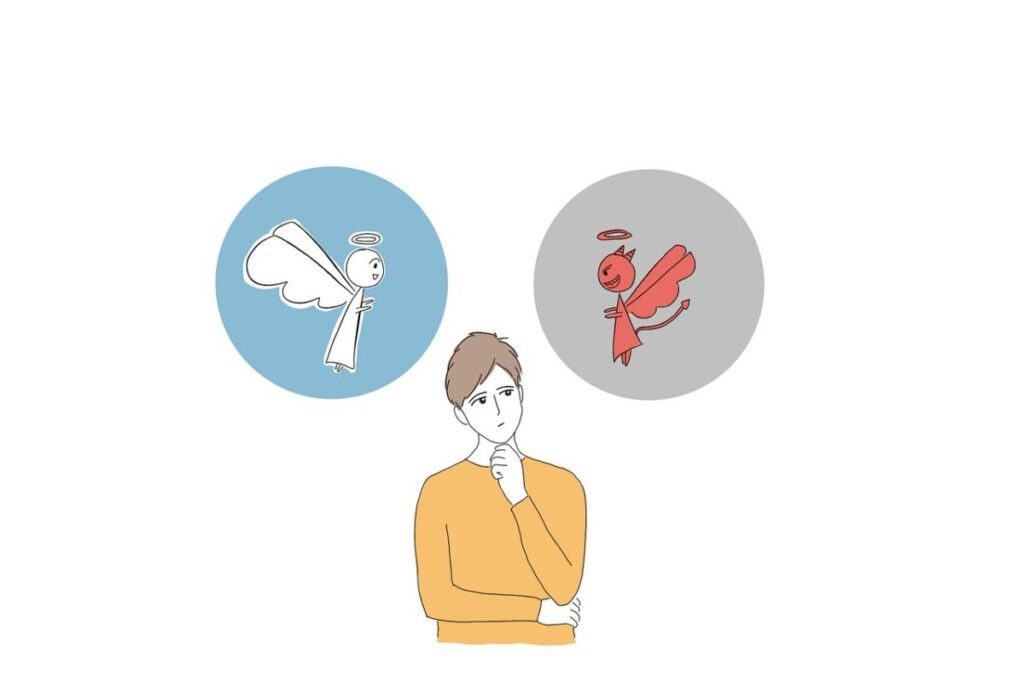Allan Kardec – or Hippolyte Leon Denizard Rivail – was the great researcher, scientist, professor and philosopher who, with extreme devotion, dedicated himself to the study of what we now know as Spiritism, or Spiritist Doctrine.
Formed on the basis of Pestalozzi's pedagogy of love and fraternity, whose principle was the investigation of causes and the deduction of their effects, Kardec was one of his most valiant disciples, having made major contributions to French education in the early 19th century.
When faced with the inexplicable but undeniable phenomena that were multiplying in France (and the world) in the middle of that century, he saw his reason confronted by something that, for him, seemed to be “carochina tale”. However, accustomed to not uttering sentences without knowing them, he launched himself to study in depth what he quickly realized was a new science that was within his reach. He quickly understood its so profound extension, capable of changing the course of all humanity, combining philosophy and science, giving rise to the explanation of what is lacking in transcendental religions, explaining and complementing them.
A new science is born
Kardec understood that it was a knowledge that gave answers to the greatest questions of humanity, starting with the existence of a world of Spirits and the possibility of our interaction with it and, from the philosophy born there, recovering the Gospel of Jesus in the task of demonstrating that it was only in each being the ability to rise from their own setbacks, improving themselves. More than that, this science demonstrated that, “to each one according to his works”, the human being, or rather, the spiritual, immortal and transcendent being of countless reincarnations, needed to learn to re-signify error, sin, guilt and reparation, removing the great weight placed by past religions of a vengeful, wrathful and sometimes perverse God.
No; God does not blame, because he knows that error is part of our progress. We should not shrink from the mistake made by ignorance, but rather learn from the mistake, that is, analyze where we went wrong, the consequences of our mistakes and then work to correct the tendencies and deviations that lead us to make mistakes.
There is something very important here that deserves an explanation. Spiritism developed, in the human part of science, on the Rational Spiritualism, a scientific movement that embraced the moral sciences in France and that started from the principle that the human being was an incarnate soul, from which will and reason would originate. It was, however, a metaphysical study, while Spiritism was a study practical, a science of observation. Understanding Rational Spiritualism and the moral sciences is of fundamental importance, because, as we know today, most spiritualist scholars at that time were rational spiritualists.
Fundamental because? Because, in this context, Spiritism, according to the Doctrine taught by the Spirits and the foundations of the ER, presents a fundamentally autonomous morality — everything relative to my own evolution depends on my own will and intelligence — while religions present a fundamentally heteronymous morality — it all depends on whether or not I want to accept what religions tell me to do, taking for this the power of God himself and the concepts of sin and punishment.
Therefore, we recommend that everyone study the book Autonomy: the untold story of Spiritism, by Paulo Henrique de Figueiredo, or accompany the several videos, on YouTube, with this theme.
Allan Kardec's Scientific Method
Kardec understood that the strength, or rather the solidity of the Doctrine of the Spirits lay in the following principles: (1) the deliberation for a new learning started from top to bottom, that is, from the superior spiritual plane, responsible for our directions, to humanity and (2) since any kind of Spirit, from the most diverse evolutionary levels, could communicate valid or false teachings to us, the study of these contents should always obey a methodology that could eliminate, as much as possible, the possibility of deception or falsification of these teachings. Kardec, in the midst of the century of scientific positivism, understood that this could only happen through scientific methodology, adopting the following criteria:
- Universal agreement of the teaching, that is, the same teaching, to be valid, would have to be obtained in different parts of the world, through different mediums, and would have to agree on its background. By doing so, Kardec largely eliminated the possibility of error or contamination of ideas coming only from one medium or group of mediums from the same group.
- reason and logic: a content, even universally concordant, would have to pass in the sieve of logic and reason, in addition to meeting the criteria already positive by science, that is, already recognizedly proven and supported by scientific analyses.
It is worth noting here that science It's not just what you do in a laboratory. Science, by definition, is the set of knowledge about a given subject, obtained through the methodological observation of causes and effects.
The cooling off of the Spiritist Movement
Unfortunately, all this study was stopped in time, being carried out, after Kardec's death, only by a few scholars, in the midst of a spiritist movement already cooled in Europe. The big question is: why this cooling? At the time of Allan Kardec, France had, according to a sense made by the Catholic Church itself, with at least 50% of the population declaring themselves spiritualist or adept at Spiritism. In Europe, the numbers multiplied and the Doctrine spread like a flame in gunpowder. However, shortly after the death of Professor Rivail, the spiritist movement suffered a huge blow, waning quickly.
Behold, very recently, through the paths opened by Spirituality, new truths documents emerged, showing what really happened and why Spiritism took the path it did. These truths are very well presented and supported in the works “O Legado de Allan Kardec”, by Simoni Privato, and “Neither heaven nor hell: The laws of the soul according to Spiritism”, by Lucas Sampaio and Paulo Henrique de Figueiredo, from the which we strongly recommend reading. We also recommend reading the work “Muita Luz”, by Berthe Fropo, easily found in PDF on the Internet and also available in our files.
Kardec's plans for the continuity of Spiritism
I will briefly explain what we can understand when reading the recommended works as a basis for this group:
Allan Kardec knew it wouldn't last forever. But it was especially after his serious health problem in 1865, when, exhausted by so much work and dedication to the spiritist cause, he almost left this world, that he became more concerned about the direction of Spiritism after his departure. He began, then, to draw new plans for the continuity of the studies of the Doctrine of the Spirits, formulating a new phase, where he would leave the position of centralizing figure, until then necessary, entering the scene of the organization of several study groups, scattered all over the place, who would take care of keep studying communications and spiritist phenomena, analyzing them and submitting them to the appreciation of a central committee that should meet, whenever necessary, to, with the agreement of the majority, under the verification of new teachings that meet the methodological criteria established above, accept or not a new content as part of the Spiritist Doctrine.
It is important to note that this committee it did not constitute an organ of superior hierarchy, but only a meeting of representatives, that could analyze the validity of such lessons obtained everywhere. Knowledge, therefore, did not come from the top down (on the earth plane) but from the bottom up, requiring only a final verification step. Kardec so planned so that it could be eliminated, maximum possible, the negative interference of opinions, prejudices, interests and individual vanities that would surely come.
It is worth remembering that Kardec himself, despite being a central figure in the studies, also did not act in such a way as to express his personal opinion, but the opposite: he analyzed, under the necessary methodology, the teachings obtained from various parties and, in the face of evidence, promptly abandoned any previous conception contrary to the subject. This, in fact, happened several times.
Spiritism suffers the great “thud“
It turns out that these personal interferences came sooner than expected. Exactly on the day that Professor Rivail was getting ready to put into practice his elaborate plans, he disincarnated. It was time, as always, for Spirituality to give way to the necessary human action in the name of progress. This action, however, was delayed.
People very close Kardec allowed themselves to be corrupted by vanity and hair personal interests and, unfortunately, in the face of inaction of the other spiritists, gave space to other people and, of course, phalanges of Spirits who fought against the light of Spiritism.
Stealthily and cunningly, these incarnate and disembodied spirits infiltrated in the Parisian spiritist movement, becoming introduce content and themes coming from just a supposed spirit, through only one medium, contents that, many times, went against what was already very well founded by the teachings of the Spirits. They went so far as to promote tampering in two works by Allan Kardec – O Céu e o Inferno and A Genesis – adulterations that were spread and that, today, are present in the vast majority of publications known around the world.
What did these adulterations take care of? to attack the main point of Spiritism, which is the big question of autonomy of the Spirit, that is, the awareness that the capacity for error, sin, guilt, punishment and forgiveness is only in each one of us. It was the release of thought still clinging to the old questions of sin, punishment and debt payment. It is the essence of intimate reform, erased by the adulterations that span more than a century and a half.
As if that weren't enough - the total abolition of Kardec's methodology, since it would necessarily deny these personalities and these thoughts that infiltrated the Parisian spiritist movement - were also burned or put into oblivion thousands of manuscripts by Allan Kardec. The burned ones may never know what they contained. The forgotten ones, however, thank the good God, were found and founded, without a shadow of a doubt, most of these studies that demonstrated the truth of this then unknown past.
Fundamentalism?
The big purpose here, however, it does not consist in debating whether there were adulterations or not, although the facts clearly and undoubtedly point to this finding. Nor does it consist, we hope it has already been made clear, in promoting a kind of cult of worship to Allan Kardec, although history also shows us clearly and undoubtedly how honest, loyal to the cause, conscientious, lucid, reasonable, insightful and even charitable this Spirit was and still is. It does consist of to recover your example, to deepen in your studies and to be based on your work, so well done, so that we can one day advance again in studies along spirituality, when the time comes again.
Foundation of the Study Group The Legacy of Allan Kardec
We founded, therefore, asking for the help of friendly spirituality, this modest group, called “Grupo de Estudos Allan Kardec's Legacy”, with the purpose not only to continue talking about the past, but, yes, to recover this past, understanding very well the essence of the Spiritist Doctrine, which goes far beyond just obtaining psychographs of deceased relatives or passes at the Spiritist Center, but which serves, as it served from the beginning, for the greater purpose of humanity's enlightenment, which, like at the time of Kardec and, today, perhaps much more, lacks the simple and consoling understanding that shows the purposes of being here and the reasons for our pain and bitterness, freeing consciences from retraction in the face of guilt or punishment and giving them all the necessary tools to resume their evolutionary journey, showing that, yes, God is all love and understanding and that, to correct the past of mistakes and guilt, all we need is the will to attack, firmly, our most intimate inclinations towards what only brings us sadness and unhappiness, born of pride and selfishness, humanity's greatest wounds.
We did not start this group, at the moment, with the purpose of putting us in mediumistic contact with spirituality, because we are not yet organized for that.. We started it, however, as a small effort to do our part, knowing that when we make ourselves available, with the firm purpose of keeping ourselves lucid through study and humble through intimate reform under the Gospel, spirituality itself will open to us the necessary paths. Let us, however, very aware and vigilant against the onslaughts that will come, perhaps from many parts. Let us, therefore, make this group a small fortress based on the principles of Jesus' morals and Spiritism, embracing all who humbly want to approach and learn, but not allowing those who only wish to insert empty polemics or criticism to be part of it. that does not yield to the evidence of the facts.
We will produce, in this group, the necessary materials, coming from our studies, which will constitute Free and publicly accessible documents to those who want to study them, through the most diverse means that the Internet guarantees us today.
To the other hearts that, willingly, are interested in joining our group or even replicating this initiative, we place ourselves fully available for support and clarification, but we always remember that it is of paramount importance not to trample the very path of this initiative by the anxiety to start mediumistic works without, first, having a solid base of studies and harmony, both in relation to the group and in relation to the individual himself.
May the good Spirits enlighten us, and may we want to be enlightened by their lights.
Paulo Degering Rosa Junior
Sorocaba, August 21, 2021




